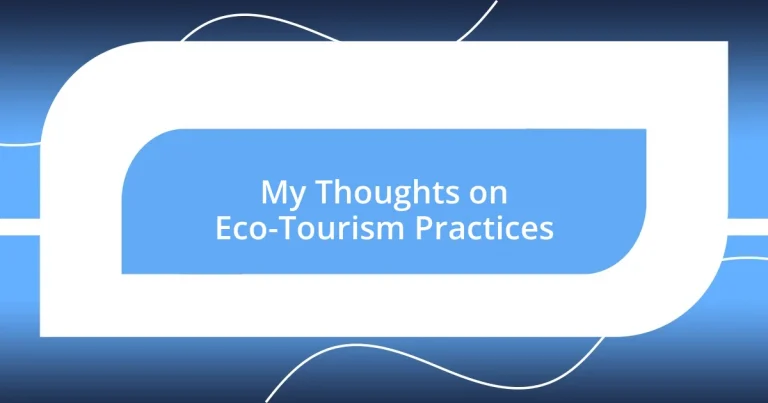Key takeaways:
- Eco-tourism emphasizes sustainability and cultural sensitivity, creating deeper connections between travelers and local communities while minimizing negative impacts on destinations.
- Key benefits of eco-tourism include supporting local economies, promoting environmental conservation, and fostering a sense of responsibility among travelers.
- Challenges include the risk of cultural erosion, funding limitations for eco-friendly initiatives, and the difference between eco-tourism ideals and actual practices, highlighting the need for genuine commitment to sustainable travel.

Understanding Eco-Tourism Concepts
When I first heard the term “eco-tourism,” I was intrigued. It’s more than just travel with a green twist; it embodies a philosophy that emphasizes sustainability and cultural sensitivity. Have you ever wondered how our travel choices impact the destinations we love? Eco-tourism strives to minimize these effects while maximizing the benefits for local communities and the environment.
I remember visiting a small eco-lodge in Costa Rica that perfectly encapsulated this concept. The owners emphasized using local materials, hiring local guides, and promoting conservation efforts. This experience made me realize how eco-tourism can foster a deeper connection between travelers and local cultures. It’s about immersing ourselves and understanding that our choices can support the community rather than exploit it.
At its core, eco-tourism invites us to reflect on our values as travelers. Are we merely looking for picturesque landscapes, or do we seek to engage responsibly with our surroundings? This mindfulness leads to richer experiences. Personally, I have found that eco-tourism encourages a sense of stewardship, reminding us that we are all part of a larger ecosystem that thrives when we choose to tread lightly.
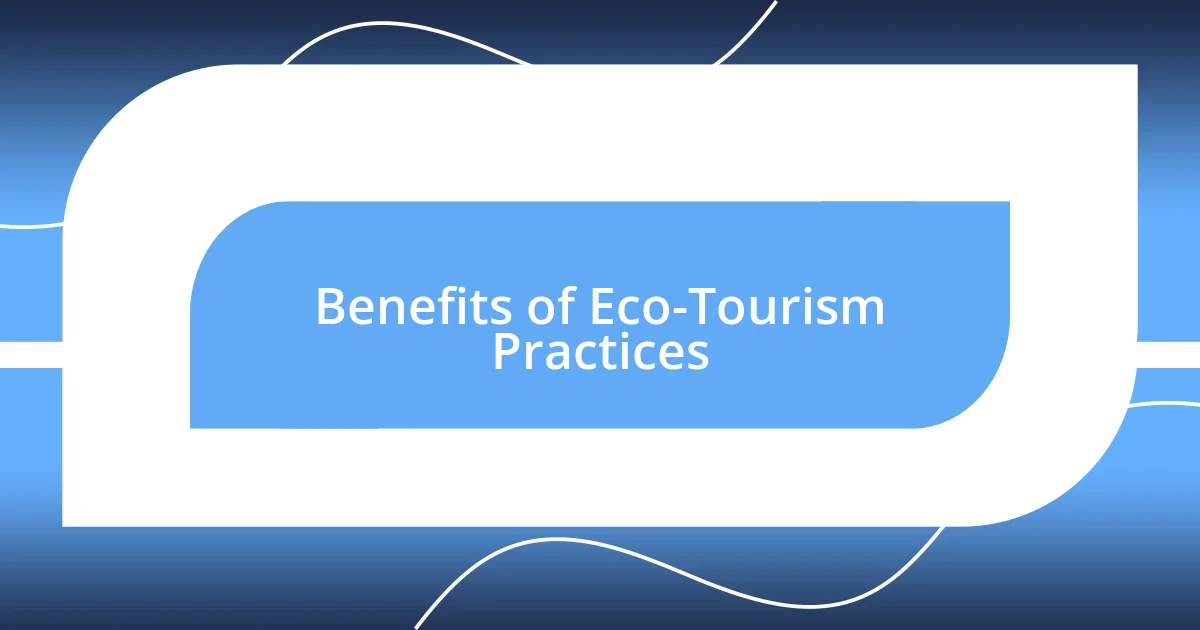
Benefits of Eco-Tourism Practices
The benefits of eco-tourism practices are profound and multi-faceted. For instance, it not only supports local economies but also encourages the preservation of cultural heritage. During my last trip to a remote village in Thailand, the eco-tourism model here created jobs for the locals, allowing them to showcase their traditions and crafts. It felt heartwarming to see how the community thrived while simultaneously protecting their customs.
Moreover, eco-tourism plays a vital role in environmental conservation. When travelers choose eco-friendly options, they contribute to efforts like wildlife preservation and habitat restoration. I recall witnessing the impact of such initiatives during a guided tour of a nature reserve in South Africa. The funds generated from eco-tourism directly supported anti-poaching programs, which made me feel proud to be part of a movement that promotes sustainable travel.
Lastly, eco-tourism fosters a sense of responsibility among travelers. It inspires us to tread lightly and respect nature’s balance, urging us to leave destinations better than we found them. After participating in a tree-planting event while staying at an eco-lodge, I developed a deeper appreciation for the ecosystems I often overlook. This also sparked my desire to engage in similar practices back home, reminding me that eco-tourism’s impact can extend far beyond travel.
| Benefit | Description |
|---|---|
| Supports Local Economies | Encourages job creation and promotes local businesses. |
| Encourages Environmental Conservation | Funds preservation efforts and supports sustainable practices. |
| Fosters Traveler Responsibility | Inspires travelers to engage in eco-friendly practices and deepen their environmental awareness. |
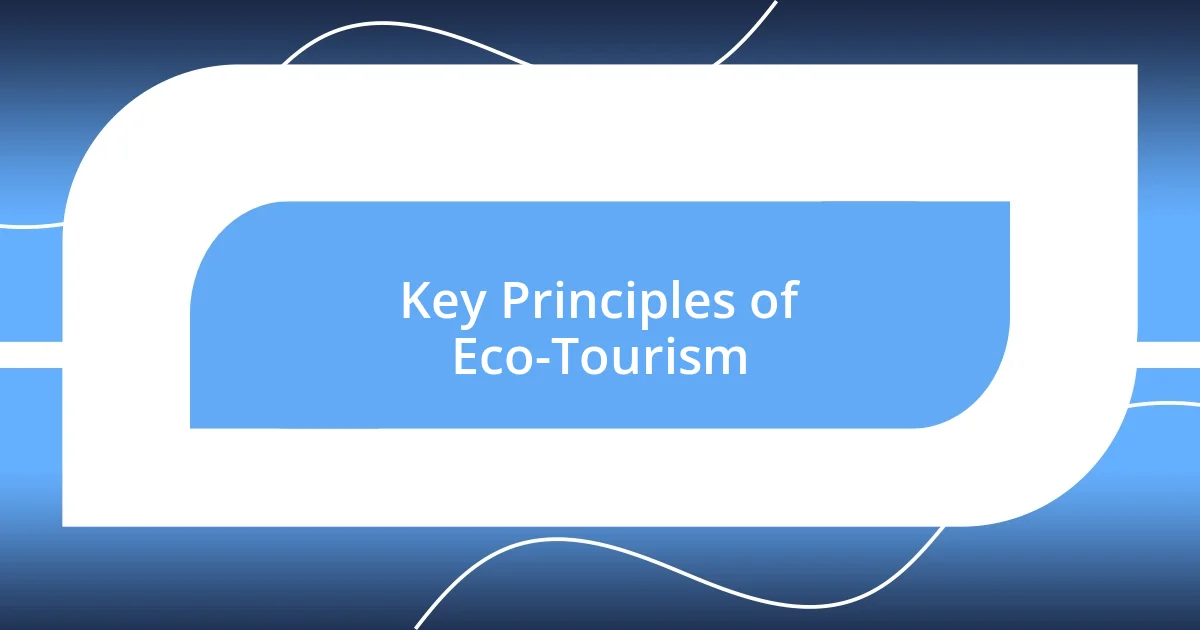
Key Principles of Eco-Tourism
The key principles of eco-tourism revolve around sustainability and respect for local cultures and environments. I’ve always found that one of the most fulfilling aspects of eco-tourism is its commitment to connecting travelers with the essence of nature and the communities they visit. For example, during a kayaking trip through the mangroves in Belize, I learned how important these ecosystems are not just for biodiversity, but for the livelihoods of the local fishing families. This realization deepened my appreciation for both the adventure and the preservation of these unique environments.
- Sustainability: Prioritizing practices that protect and sustain the environment for future generations.
- Cultural Sensitivity: Engaging with local cultures respectfully and authentically.
- Support for Local Economies: Ensuring that tourism revenue benefits the communities visited.
- Environmental Education: Promoting awareness and understanding of local ecosystems and conservation needs.
Reflecting on another experience, I participated in a community-led conservation project in Madagascar. There, I felt the weight of my responsibility as a traveler to make choices that not only enhanced my experience but also benefited the local people and the environment. The villagers shared their struggles with deforestation, and it was heartening to see how small efforts—like responsible eco-tourism—could create a ripple effect of change. Ultimately, these principles guide not only sustainable practices but also encourage us to form genuine connections with the places we explore.

Sustainable Travel and Tourism Choices
When it comes to sustainable travel, I’ve learned that the choices we make can significantly influence the environments we visit. On my last trip to Costa Rica, I opted for a locally-owned guesthouse instead of a large resort. That decision not only provided me with a more authentic experience but also ensured that my money stayed within the community, directly benefiting local families and small businesses. Have you ever considered how your accommodations impact the places you explore?
I’ve also discovered that transportation choices matter just as much. During a cycling tour in the Netherlands, I felt invigorated while pedaling through stunning landscapes and charming towns. It opened my eyes to the joy of reducing my carbon footprint. Each turn of the pedal was a reminder that we can travel sustainably while still enjoying the journey. Isn’t it empowering to think our travel choices can promote a healthier planet?
Eating locally is another powerful facet of sustainable tourism that I cherish. I remember savoring delicious meals made from fresh, organic ingredients during a farm-to-table experience in Italy. Conversations with the local farmers not only deepened my understanding of their culture but also highlighted the importance of supporting local agriculture. It made me feel connected to the land in a way that typical tourist meals simply can’t provide. How often do we pause to think about where our food comes from while traveling?

Community Engagement in Eco-Tourism
Community engagement is a cornerstone of eco-tourism, as it ensures that local voices are heard and included in tourism development. I vividly remember attending a community meeting in a small village in the Peruvian Andes, where residents openly shared their hopes and concerns about tourism’s impact on their way of life. Listening to their stories, I felt an emotional connection to their experiences, realizing that eco-tourism isn’t just about visiting new places; it’s about uplifting these communities and respecting their narratives.
I’ve also seen how engaging local leaders can foster stronger relationships between tourists and the community. During a wildlife conservation tour in Uganda, our guide was a local woman who had grown up in the area. She passionately shared her community’s efforts to protect endangered species while integrating cultural practices into tourism. It struck me how empowering locals not only enriched our experience but also created a sense of pride and ownership among the residents. Isn’t it inspiring to see how collaboration can lead to meaningful change?
Ultimately, active community participation can turn eco-tourism into a two-way street, where both travelers and locals benefit. I once participated in a volunteer program that helped build eco-friendly lodges, and the gratitude from the community was palpable. It made me reflect on how, through such initiatives, we can forge lasting connections and address real social issues. How can we ensure that the communities we visit feel valued and supported, rather than just being passive hosts to our adventures?
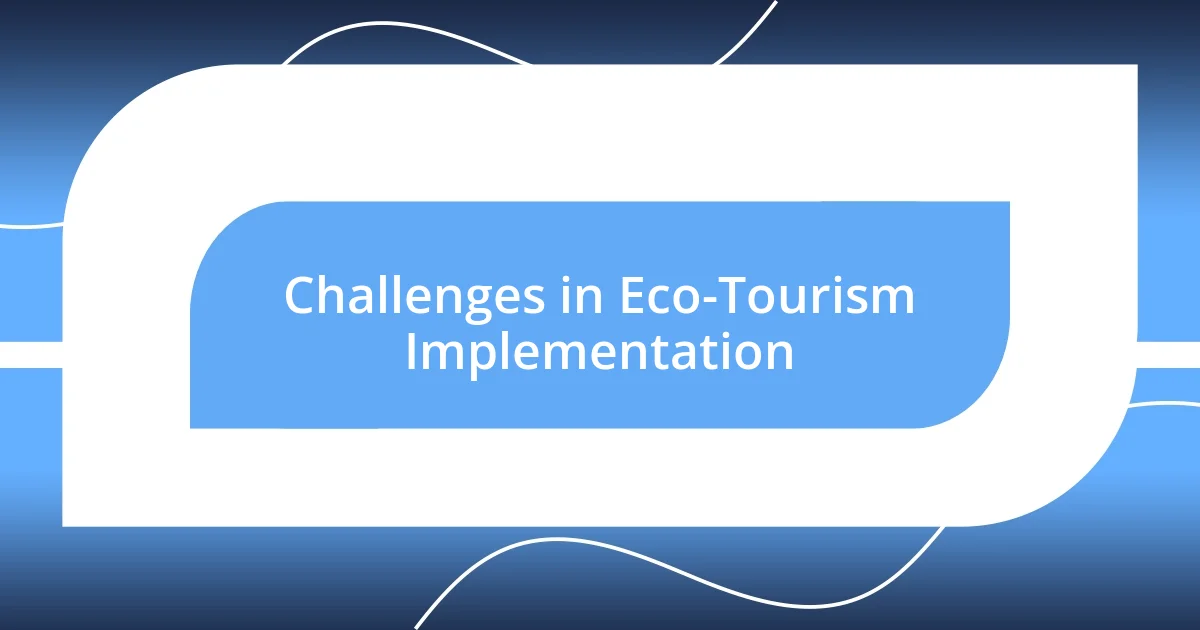
Challenges in Eco-Tourism Implementation
One significant challenge in implementing eco-tourism practices is the potential for cultural erosion. During my travels in a remote village in Thailand, I observed how the influx of tourists began to alter traditional customs. I felt a mix of sadness and concern as local artisans adjusted their crafts to cater to tourists instead of preserving their authentic styles. Isn’t it crucial for us to consider how our presence can influence the very cultures we wish to appreciate?
Moreover, funding and resources can pose hurdles in eco-tourism development. I’ve seen small towns struggle to maintain their eco-friendly initiatives due to insufficient financial support. An eco-lodge I visited in Brazil had ambitious plans for sustainability, but limited budget constraints hindered their progress. It led me to wonder: How can local governments and organizations better support these valuable efforts to ensure they can thrive?
Lastly, there’s often a disconnect between eco-tourism ideals and actual practices. I remember visiting a supposedly eco-friendly safari in South Africa, only to find vehicles roaring through the wildlife areas, contributing to noise pollution and stressing the animals. This experience made me reflect on the importance of genuine commitment over mere marketing slogans in eco-tourism. Isn’t it vital for us as travelers to seek out authentic eco-friendly practices rather than just feel-good labels?
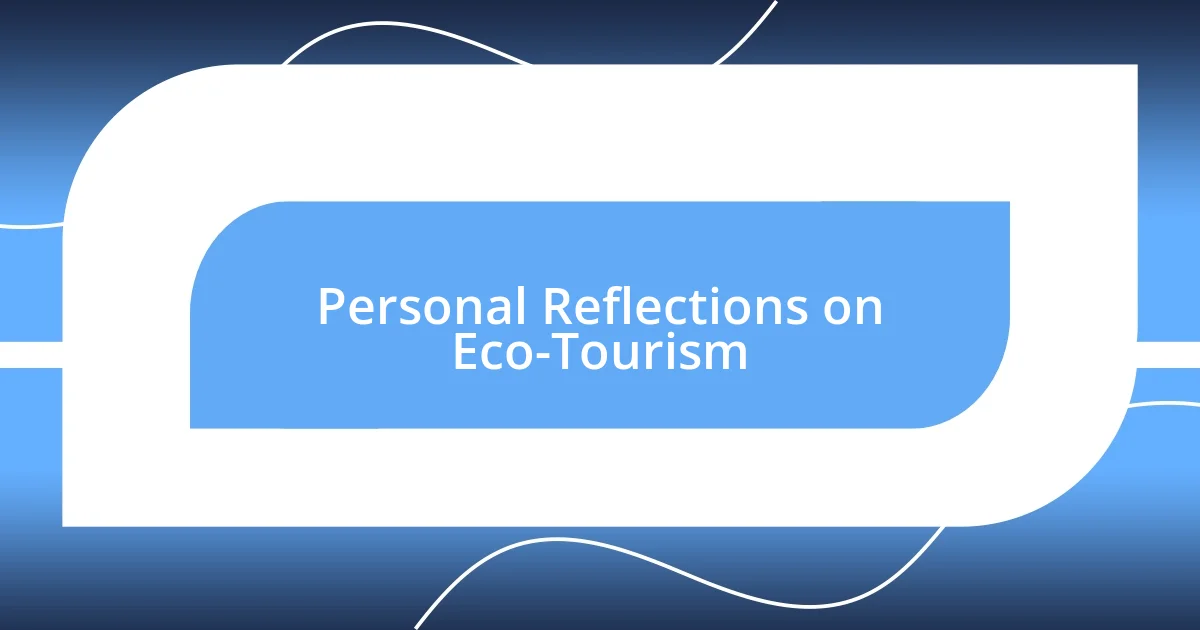
Personal Reflections on Eco-Tourism
Reflecting on my eco-tourism experiences, I can’t help but think about the delicate balance between tourism and environmental preservation. On a trip to the Galápagos Islands, I met a guide who dedicated his life to protecting the unique ecosystem there. Listening to him share about the fragile species and their struggles against human impact was eye-opening. It made me realize how vital it is to adopt practices that prioritize the planet’s health — not just for today, but for generations to come.
I also found myself pondering the responsibility we bear as travelers. After hiking in a forest reserve in Costa Rica, I stumbled upon a group of tourists upset that they couldn’t feed the monkeys. I felt compelled to explain how feeding wildlife alters their natural behaviors. Isn’t it intriguing how our common sense sometimes gets clouded by desire? I believe it’s crucial for eco-tourism to foster not only awareness but also a deep respect for nature.
Sometimes, while reflecting on these experiences, I wonder about the long-term impacts of our travel choices. During a beach cleanup in Thailand, seeing the stark contrast between pristine nature and the litter left by visitors tugged at my heart. It drove home the need for a shift in mindset among tourists. How can we make sure that when we roam the earth, we leave each place better than we found it?












